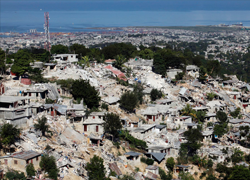One year after the presidential election and one month after the unexpected resignation of the Prime Minister, the stability of Haiti’s political system remains unclear. The consequences of this political instability are widespread and reverberate throughout every Haitian household. The constant political strife also weighs heavily on potential donors of humanitarian aid. As a result, most marginalized and vulnerable members of Haitian community, including the internally displaced and homeless populations, face an increasingly precarious future.
Former Prime Minister Garry Conille abruptly resigned last month after none of his cabinet members showed up for a meeting he scheduled. Conille, who previously served as a chairman with President Bill Clinton on The Interim Haiti Recovery Commission, was criticized for his plan to audit $600-$800 million no-bid contracts granted for humanitarian assistance after the 2010 earthquake. This audit angered President Michel Martelly and frustrated other members of the Parliament.

After Conille’s resignation President Martelly continues to fight back against international critics and Haiti’s internal grapevine of rumors, “teledjol” in Creole. These rumors are spread through local radio and social media such as Twitter. The most recent teledjol related to Martelly’s potential dual nationality brought Port-au-Prince to a standstill. Such chaos and the possibility that Martelly may be ineligible to serve as President (if found to hold dual nationality), does little to convince donors that their much needed support would be used appropriately.
The current political climate in Haiti, when combined with the plethora of critical reports about nongovernmental work and misuse of donations demonstrates why many funders have fallen short of their promise to donate. Despite these reports, there is no doubt that the general Haitian population has vast unmet needs that could partially be addressed with monetary donations. Just this month the United Nations Central Emergency Fund (CERF) allocated US$ 8 million to Haiti in response to an overwhelming shortfall of resources needed to support humanitarian operations.
At a time when humanitarian aid and politics are again at a crossroads, one might ask, how the Haitian population will overcome this surmountable impasse. Some Haitians argue that greater accountability and progress can be attained by increased Haitian involvement. Others, who have suffered human rights violations as a result of the politicization of humanitarian aid, pursue legal redress with the Office of the High Commissioner for Human Rights.


